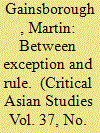| Srl | Item |
| 1 |
ID:
071013


|
|
|
|
|
| Publication |
2005.
|
| Summary/Abstract |
This article challenges the all-too-common assumption in the literature on Vietnam that Ho Chi Minh City's political economy has evolved differently from the rest of the country since the economic reforms of the late 1980s. Questioning the association of Ho Chi Minh City with reform, the article charts the rise of new state business interests and the growth of the "gatekeeping" state in the city during the 1990s, as party-state institutions moved to exploit new opportunities that emerged with the dismantling of the central plan and the growth of the market economy. In light of this characterization, the article argues that rather than seeing the city as set apart from the rest of Vietnam we can speak of a "common reform political economy." If correct, this position casts doubt on existing literature, which commonly explains Ho Chi Minh City's supposedly distinctive evolution under reform with reference to its unique pre-1975 history, especially the period from 1954 to 1975 when the country was divided along the seventeenth parallel. Asking how we might marry the fact ofHoChi Minh City's distinctive history with the reality of its un-distinctive evolution under reform, the article concludes by calling for a rethink not only of the legacy of 1954-75 for Ho Chi Minh City's latter-day development but also of the way in which the city's shorter period under central planning nevertheless left its mark.
|
|
|
|
|
|
|
|
|
|
|
|
|
|
|
|
| 2 |
ID:
090717


|
|
|
|
|
| Publication |
2009.
|
| Summary/Abstract |
This paper highlights three key weaknesses with the developmental state as a theory of the state. First, that the theory imagines the state in Weberian terms and then seeks to judge all states-even ones which are not Weberian-according to Weberian yardsticks which are not universal. Second, that the theory underestimates the extent to which it is itself bound up with dominant global power structures associated with the Cold War and the post-cold war period. Third, that in its concern to identify the correct 'institutional mix' for development to occur, developmental state theorists ends up believing that the (best) states really do stand apart from society, forgetting that this is an illusion which is fundamental to how states rule. Not to be alert to the state's 'ideological effects' is not really to study the state at all; this is ultimately a criticism which has to be levelled at the theory of the developmental state. To suggest-as many scholars do-that the theory's weaknesses can be solved by breaking the state down into its constituent parts, focusing more on society, or trying to locate the 'blurred' boundary between state and society more effectively, completely misses the point, since it does little, if anything, to uncover how states really rule. The issues are explored via a comparison of the state in Singapore and Vietnam.
|
|
|
|
|
|
|
|
|
|
|
|
|
|
|
|